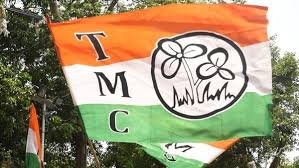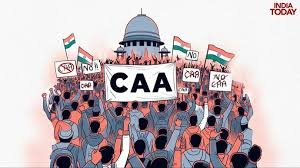On Wednesday, the Trinamool Congress (TMC) unveiled its manifesto for the upcoming Lok Sabha elections, pledging to revoke the Citizenship Amendment Act (CAA) and cease the National Register for Citizens (NRC).
 “The flawed Citizenship (Amendment) Act will be repealed, and the National Register of Citizens will be halted. The Uniform Civil Code will not be enforced nationwide,” stated the manifesto.
“The flawed Citizenship (Amendment) Act will be repealed, and the National Register of Citizens will be halted. The Uniform Civil Code will not be enforced nationwide,” stated the manifesto.
Derek O’Brien, the TMC Parliamentary leader in the Rajya Sabha, stated that the manifesto, named Didir Shopoth (Didi’s promises) and comprising 10 points, outlines commitments such as providing 100 days of guaranteed work with increased minimum wage, housing for the poor, distribution of 10 free LPG cylinders to BPL families, doorstep delivery of free ration, raising old-age pension, imposing a cap on fuel prices, establishing a price stabilization fund to manage price fluctuations, introducing a student credit card for pursuing higher education, and offering financial assistance to girls and women, among other initiatives. O’Brien emphasized that this manifesto represents the TMC’s commitment upon forming the Union government as part of the INDIA alliance.
In addition to vowing to revoke the Citizenship (Amendment) Act (CAA), the TMC has outlined several initiatives in its manifesto for the 2024 Lok Sabha elections.
– All graduates and diploma holders aged up to 25 will be offered one-year apprenticeships with a monthly stipend.
– Students pursuing higher education will be entitled to Student Credit Cards with a maximum limit of Rs 10 lakh.
– The number of scholarships for SC, ST, and OBC students pursuing higher education will be tripled.
– The existing Old Age Pension for individuals aged 60 and above will be increased to Rs 1,000 per month (Rs 12,000 annually).
– Measures will be implemented to cap the prices of petrol, diesel, and LPG cylinders to ensure affordability.
Each Below Poverty Line (BPL) household will be provided with 10 LPG cylinders annually at no cost, ensuring access to clean cooking fuel. All holders of job cards will be assured of 100 days of guaranteed employment, with a minimum daily wage of Rs 400 for all workers. Dignified housing will be guaranteed for every impoverished family nationwide, ensuring that all individuals have secure and safe homes.
 Mamata Banerjee on BJP & CAA
Mamata Banerjee on BJP & CAA
West Bengal Chief Minister Mamata Banerjee has once again criticized the BJP-led central government over the Citizenship Amendment Act (CAA), National Register of Citizens (NRC), and Uniform Civil Code (UCC). These issues have been contentious between the two parties, notably during the lead-up to the 2019 Lok Sabha election. She also urged for collective efforts to oust the BJP “landlords” and create opportunities for a respectful livelihood for everyone.
Banerjee emphasized her stance, stating, “No NRC, no CAA, and no UCC. Every citizen has their rights.” She urged families to ensure that their members working outside the state return to cast their votes, warning that their names might be struck off otherwise. She metaphorically likened the CAA to the head of a fish, the NRC to its tail, and the UCC to the rest of the fish.
 In contrast, BJP leaders have countered these assertions, claiming that falsehoods and rumors are being spread about the CAA and NRC.
In contrast, BJP leaders have countered these assertions, claiming that falsehoods and rumors are being spread about the CAA and NRC.
During a rally in Raiganj, North Bengal, Prime Minister Narendra Modi accused the Trinamool Congress (TMC) of opposing the Citizenship Amendment Act (CAA) and allegedly spreading misinformation. Modi claimed that the TMC is reluctant to grant citizenship to partition victims while allowing Bangladeshi and Rohingya infiltrators to alter West Bengal’s demography and disrupt law and order.
He criticized the TMC for prioritizing their political interests over the state’s welfare. Additionally, the TMC’s manifesto was released in six languages, including English, Hindi, Bengali, Urdu, Nepali, and Ol Chiki script.
A brief intro to CAA
The Citizenship Amendment Act (CAA) is a piece of legislation passed by the Indian Parliament in December 2019. It amends the Citizenship Act of 1955 to provide a path to Indian citizenship for religious minorities from Afghanistan, Bangladesh, and Pakistan who entered India before December 31, 2014, and faced persecution on the basis of religion.
The CAA specifically benefits Hindus, Sikhs, Buddhists, Jains, Parsis, and Christians from these countries. Critics argue that the law is discriminatory as it excludes Muslims and violates the secular principles of the Indian Constitution. The CAA, along with the proposed National Register of Citizens (NRC) and the National Population Register (NPR), has sparked widespread protests and debates across India.










